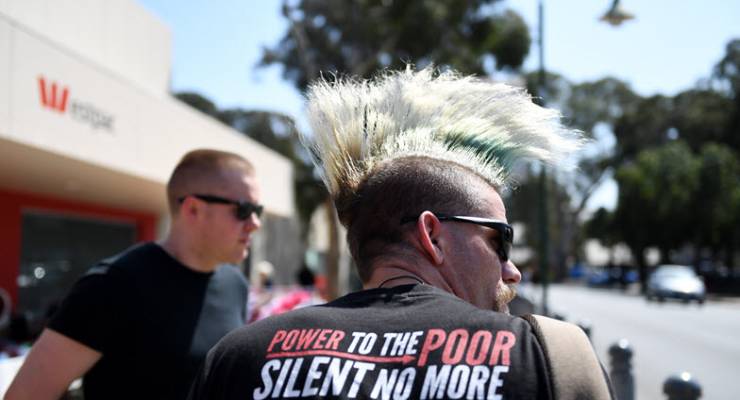
This year, job seekers and social security recipients have endured an interminable series of nightmares needlessly and heartlessly inflicted upon us by our government.
Although Australia wields the toughest compliance system in the developed world, the Coalition inflicted even more punishments and demands on unemployed workers — who now receive the second-lowest level of income support in the entire OECD.
This year, our new prime minister has displayed contempt for social security recipients. In the lead-up to Anti-Poverty Week, Scott Morrison revealed plans to force job seekers out of their homes and communities to perform farm labour — in order to “justify” their receipt of entitlements.
Moreover, we learned that the disastrous Community Development Program (CDP) has punished rural, Indigenous participants in record numbers — imposing a record 740% more financial penalties for “non-compliance”.
Through their Social Services Legislation Amendment Bill, the LNP gave job agencies new, unprecedented powers to impose “demerit point” punishments which continue to strip job seekers of payments. Now, privately owned job agencies are cutting Australians off Newstart with no review from Centrelink — a move designed to keep job seekers utterly powerless to resist punishments.
Through the same bill, the Coalition also ramped up activity demands for older job seekers — who have become the fastest growing group of Newstart recipients. Since July, unemployed Australians aged 50-59 have been forced to perform 30 hours of activities a fortnight (up from 15) to keep their paltry entitlements.
Through “welfare” programs like Work for the Dole and CDP, more and more poor Australians are being turned into cash cows for private corporations. For example, Indue’s Cashless Debit Card (CDC) ultimately nets the company $10,000 per participant. This year, we’ve seen countless reports that the CDC is disempowering remote communities, and contributing to a rise in family and domestic violence.
All the while, unfair and illegal Centrelink debt collections (“Robo-debts”) continue to push vulnerable Australians to the point of suicide.
For a large number of low-income Australians, every year may seem like an annus horribilis — but 2018 has surely felt like the worst year in recent memory. Australia’s income support service has essentially morphed into a ruthless system of digital algorithms, which targets and punishes our poorest citizens.
In the face of these onslaughts on the rights and dignity of the poor, our so-called opposition has shown little resistance. Despite increasing public pressure to #RaisetheRate, Labor has again failed to commit to raising Newstart at this week’s National Conference. Even though Work for the Dole has already resulted in one job seeker’s death — and continues to injure others — the ALP refuse to heed calls for the program’s abolition.
Given their dominance in the polls, Labor and Shorten seem uniquely positioned to exercise leadership in repudiating punitive welfare programs. That’s why it’s incredibly disheartening to see Labor drag its heels, dispose of its backbone, and refuse to commit to an agenda which centres the struggle of the poor. Beyond beating the Liberals, and winning the next election, it can be mighty difficult to determine what this party actually stands for.
To give Labor some credit, it thankfully announced plans to abolish the CDP program — which will bring welcome relief to Indigenous communities all across the country. This was a great win for The First Nations Workers Alliance — a new union of Indigenous advocates whose tireless lobbying and campaigning put much needed pressure on Labor to axe the scheme.
In what has been an incredibly grueling year, low-income advocates have triggered a Senate inquiry into Jobactive, lobbied more than 20 local councils to advocate for a raised Newstart, and galvanised communities to fight back against the Coalition’s attacks on their welfare.
It’s an uphill battle, but groups like the The First Nations Workers Alliance, Anti-Poverty Network and Australian Unemployed Workers’ Union have set out to reclaim the original promise and intent of social security: a system of dignified and unconditional support for every Australian who needs it.
Despite all the attacks leveled at them, social security recipients are organising themselves from the margins, building their power and capacity to change policy for the better.
Whether Labor wins the next election or the Liberals miraculously manage to hold on, one thing remains clear: real justice and hope for the poor is coming from outside parliament rather than inside of it.







This exposes the inexcusable and shameful treatment of our citizens who are regarded with contempt. Labor has dropped the ball again on this. The advocacy groups fighting for these people should be listened to and their advice acted on now. Putting off any hope of change for 18 months if elected is immoral and unnecessary. You will be judged by the way the least of us are treated Labor.
how does that guy serious expect to be offered a job with a haircut like that
Ah, but if we don’t scapegoat the unemployed, the sheeple might start to question the last 40 years of neoliberalism which has been so good to the big capitalists and their servants in the two major parties. Why change a system that’s working?
If bumBoil Shlernt doesn’t promise to abolish robodebt on day one after he is elected he won’t surprise me in the least.
Like his ‘promise’ to look at the woeful dole rate – not increase it, just look at it.
Try looking in a mirror you, reprehensible excuse for a ‘Labor’ leader.
Converting groups of vulnerable persons into resources to be managed by private companies utilising Federal regulations in conjunction with Commonwealth grants has become a hallmark of this nations management of the population. The NDIS can be seen as the commodification of the disabled and their conversion into a resource. Similarly the unemployed, refugees, prisoners, indigenous, are objectified as income streams.
That’s a bleak view Harry. All the worse for being 100% accurate.
Yes, Harry, too true, unfortunately. But it’s a nice little earner – much like slavery was.